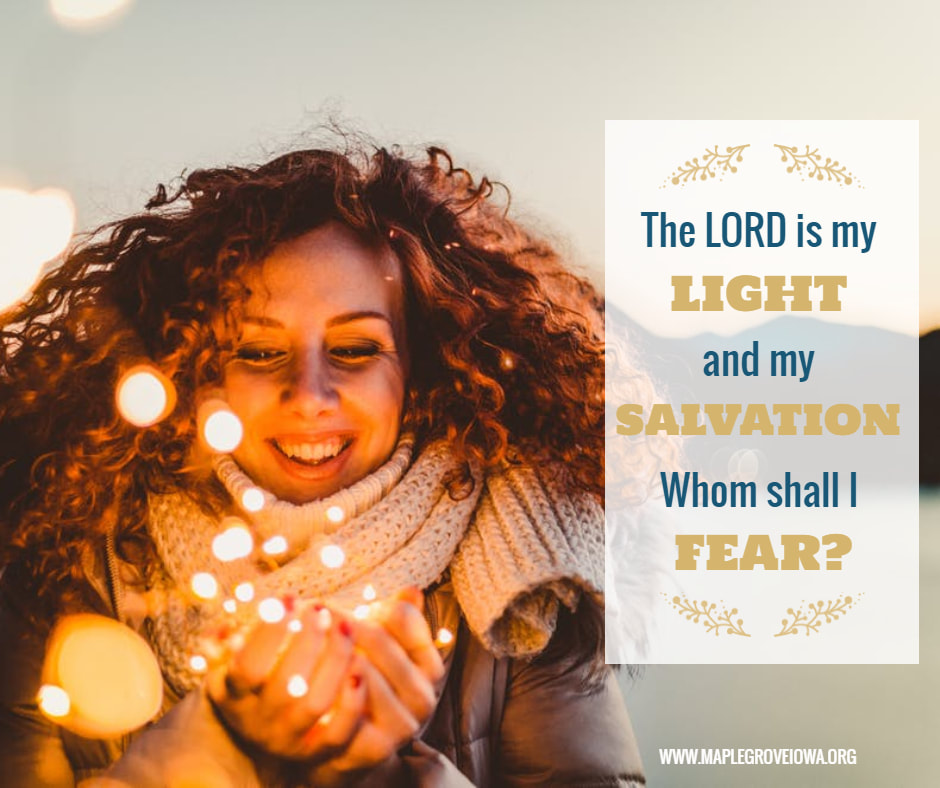|
Follow along with daily scripture readings and insights that will enhance your faith journey.
|
MAPLE GROVE UNITED METHODIST CHURCH
|
"Fear of the Other" January 20, 2019 – Unafraid – Living with Courage and Hope
“Fear of the Other” Scripture: The Lord is my light and my salvation; whom shall I fear? The Lord is the stronghold of my life; of whom shall I be afraid?… Wait for the Lord; be strong, and let your heart take courage; wait for the Lord! Psalm 27:1 and 14 “You have heard that it was said, You must love your neighbor and hate your enemy. But I say to you, love your enemies and pray for those who harass you.” Matthew 5:43-44 There is no fear in love, but perfect love drives out fear…We love because God first loved us. If anyone says, I love God, and hates a brother or sister, he is a liar, because the person who doesn’t love a brother or sister who can be seen can’t love God, who can’t be seen. I John 4:18a and 19 MONDAY 1.21.19 – Should I fear anyone? Read: Psalm 27:1-5 Reflect: Within the confines of time, the promises of Psalm 27 do not always come true. But our God is eternal, not bound by time, so we need not fear—anyone or anything. Dr. Martin Luther King, Jr. said, at the funeral of four girls killed in a church bombing in Birmingham, Alabama, “Like the everchanging cycle of the seasons, life has the soothing warmth of the summers and the piercing chill of its winters. But through it all, God walks with us. Never forget that God is able to lift you from the fatigue of despair to the buoyancy of hope.” * • Israelites who prayed and sang this psalm saw Babylon destroy Jerusalem, saw Rome overpower their land—yet they still trusted. Christians saw Jesus crucified, the apostles Paul and Peter martyred by Rome, prayed the psalm in dim Roman catacombs—yet they still trusted. What difficulties test your trust, and seek to make you afraid? How can you trust that in the end God will always keep the promise to set you up high, safe on a rock? • Verse 4 said, “I have asked one thing from the Lord… to live in the Lord’s house all the days of my life, seeing the Lord’s beauty.” In his beloved book Practicing the Presence of God, Brother Lawrence wrote to God, “Thou knowest well that it is not thy gifts that I desire… but Thyself.” What draws you to adore and yearn for God with anything like that kind of intensity? Pray: Lord Jesus, grow in me an ever-deepening trust in your eternal presence and power, and your great heart of love. Amen. * “Eulogy for the Martyred Children,” in James M. Washington, ed. A Testament of Hope: The Essential Writings and Speeches of Martin Luther King, Jr. San Francisco: HarperCollins, 1986, p. 222. TUESDAY 1.22.19 – God doesn’t play favorites Read: Leviticus 19:33-34, Deuteronomy 10:14-19 Reflect: We often think of Old Testament Israel as exclusive and narrow toward non-Israelites. But here we read, “Any immigrant who lives with you must be treated as if they were one of your citizens. You must love them as yourself.” Israel’s faith stressed God’s concern for all people, especially those who needed help. In theory (though too often not in practice—e.g. Isaiah 58:2-10), Israel was a nation in which everyone was responsible to seek the well-being of all. • God told Israel to remember their history as poor immigrants when they were a settled people into whose land others might immigrate. What does this suggest about how God sees people of all nations and races? As God’s follower, how can you live out that same spirit in your attitudes and actions today? • All over the world, in virtually every nation and culture, those who are “different,” who are “outsiders,” face prejudice because of ethnicity, poverty, lack of education or many other markers of “otherness.” When have you seen people who are “other” treated that way, or been treated that way yourself? How can you make things better rather than worse when such ugly actions happen? Pray: Lord of all, when difference offends me, or when prejudice enrages me, remind me that you came to change my heart. Help me, like you, to meet evil with good. Amen. WEDNESDAY 1.23.19 – “Love your enemies” Read: Matthew 5:43-48 Reflect: Dr. Martin Luther King, Jr. preached his last Christmas Eve sermon on December 24, 1967. It included these words: “Agape is an overflowing love which seeks nothing in return…. This is what Jesus meant when he said, ‘Love your enemies.’ And I’m happy that he didn’t say, ‘Like your enemies,’ because there are some people that I find it pretty difficult to like…. I’ve seen too much hate to want to hate, myself… every time I see it, I say to myself, hate is too great a burden to bear.” * • Jesus (and Dr. King) knew that one of the most common ways we deal with fear is to turn it into hate toward those we fear. But following the teaching of Jesus, Dr. King said there’s a better option. To those he called “our most bitter opponents,” Dr. King declared, “We will meet your physical force with soul force. Do to us what you will and we will still love you…. be assured that… we will so appeal to your heart and conscience that we will win you in the process, and our victory will be a double victory…. the truth crushed to earth will rise again.” ** How can you more and more live into the God-given spirit of agape toward whatever frightening people and forces you face, big or small? Pray: O God, make me an instrument of your peace. Grow in me confidence in the long-term power of love, the world-changing power that makes me a follower of Jesus. Amen. * “A Christmas Sermon on Peace,” in James M. Washington, ed. A Testament of Hope: The Essential Writings and Speeches of Martin Luther King, Jr. San Francisco: HarperCollins, 1986, p. 256. ** Ibid., pp. 256, 257. THURSDAY 1.24.19 – Jesus saw people, not “enemies” Read: Luke 9:51-56, John 4:4-10 Reflect: Just knowing Jesus was going to Jerusalem led a Samaritan village to refuse to allow him to stay in their village. Jews hated Samaritans, a mixed race born of Assyria’s policy of wiping out the identity of conquered peoples (2 Kings 17:24). Samaritans hated Jews, who snubbed their offer to help rebuild the Temple (Ezra 4:1-4). Each side’s fear of the other had hardened for 700 years. The Samaritan woman was astonished that Jesus would ask for something as simple as a drink of water—yet Jesus reached out to Samaritans, again and again, rather than fearing or avoiding them. • In Luke 9, the Samaritan villagers were rude and unwelcoming. James and John reacted as we are often tempted to. “Lord, do you want us to call fire down from heaven to consume them?” they asked. But Jesus said no. Have you ever been in a position either to fan the flames of hatred higher, or to lower the temperature and move toward peace? Which course did you choose? How did things work out? • What risks of misunderstanding, damage to reputation, rejection or rudeness existed for Jesus when he chose to engage the Samaritan woman in conversation at Jacob’s Well? What made him willing to take those risks in order to offer “living water” to a member of a different and despised race, and a disgraced woman at that? What does his model teach us about fearing people who are different? Pray: Lord Jesus, it’s true that “hurt people hurt people.” But you refused the path of fear and anger even when snubbed. Transform my heart to be more like yours each day. Amen. FRIDAY 1.25.19 – The apostles preached the gospel to “enemies” Read: Acts 8:5, 25; 10:9-28 Reflect: Jesus’ example made a difference, and Acts reported that the apostles preached in many Samaritan villages. But even after what happened at Pentecost, Peter still felt the reluctance he’d learned all his life about mixing closely with Gentiles, especially Romans. God had to propel him dramatically, using a startling vision, to break down some of those inner barriers. (This is a great story—if you have time, read the whole thing in Acts 10:1–11:18.) • Peter’s vision struck him so hard because, like all devout Jews, he carefully followed the laws (especially in Leviticus 11) which forbade eating “unclean” meat. Those laws were not about kitchen hygiene, but about an approach to ceremonial “cleanness” before God. Entering a Gentile dwelling also brought ceremonial impurity (cf. John 18:28). What made Peter’s mission “clean”? Are there any places or people you avoid because you fear they might make you “unclean”? • Even after his vision came three times, Peter didn’t fully get the point. Verses 27-28 of the story suggest that meeting a large group of Gentiles eager to hear the gospel was his “aha!” moment. Have you ever had a particular contact or experience that broke through some prejudice of yours, and opened your eyes to God’s inclusive mission in the world? Pray: Lord God, it feels so natural, in so many ways, for me to divide the human family into “us” and “them.” Teach me what you taught Peter—that in your eyes, there is only “us.” Amen. SATURDAY 1.26.19 – No fear in love Read: Galatians 3:26-28, 1 John 4:18-21 At the foundation of all Christian faith is the trust that God loves us, that God created human beings out of love and for love. This was (and is) quite extraordinary. Egyptians, Canaanites, Greeks or Romans—none of them believed their gods loved them. But Christians believe Jesus embodied that belief, and showed us how it shapes life for the better. And that belief makes a real difference in how we relate to all other people, those who are close to us and those who are “other.” Paul told the Galatians that in Jesus ethnic, economic/social and gender distinctions all lost their power to divide us and cause fear and separation. • Why would perfect love drive out fear? Have you ever experienced a situation in which as love developed for another person, fear of that person decreased and disappeared? 1 John 4:20 got blunt, and may make us uncomfortable: “If anyone says, I love God, and hates a brother or sister, he is a liar.” To what extent do you agree that hate for human beings rules out genuine love for God? Why would that be the case? Can you think of practical steps that move you in the direction of caring about “others,” about people that you may see as dangerous enemies, as deserving of fear and distrust rather than of love? Pray: Lord Jesus, sometimes I find your ways appealing. Sometimes I find them hard. I need your grace to guide and energize me to more and more see everyone as a person you love, even the ones who frustrate or scare me. Amen. Family Activity: Jesus served and shared God’s love with others in many ways. Martin Luther King, Jr. followed in the footsteps of Jesus and sought to do the same. How does your family work together to share God’s love with others? Select a way to serve others together. Ask an older child or youth to research some volunteer opportunities in your area. Consider brainstorming about some less-structured ways you can serve others with God’s love, such as helping others in your neighbor or at school. At a family gathering, ask the child or youth to present these opportunities to the rest of the family. Pray for God’s guidance as you discuss the possibilities. Choose one or two ways your family can share God’s love with others.
0 Comments
Leave a Reply. |
GPS GuideWhether you’re just starting to explore the Christian faith, or you’re a long-time Christian, we want to do everything we can to help you on your journey to know, love and serve God. The GPS (Grow, Pray, Study) Guide provides Scripture and insights to enhance your journey.
Archives
April 2019
Categories |
|
9155 Ashworth Rd
West Des Moines, IA 50266 Mailing address: PO BOX 845, Waukee, IA 50263 515.987.1402
Pastor Robbin 515-577-5714
Contact us at [email protected]
|

 RSS Feed
RSS Feed

